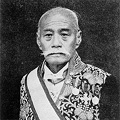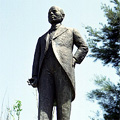As the demands to reform the old customs of privilege grew along with the democratic movement in Okinawa, the prefectural authorities were obliged to make moves on the reforms.
When the prefecture's governor during that period, Shigeru Narahara, took office he permitted the reclamation of the Somayama lumber forests managed in common by the farmers under the old royal government and provided relief measures for the poverty stricken lower class samurai families. The push for these reforms came from Noboru Jahana, born in a farming family and one of the first prefectural scholarship students to be sent to the mainland for study.
There were voices heard that this reform would lead to the destruction of the forests and a shortage of resources because of over-harvesting. However, Jahana persuaded the farmers that the cultivation of the land was necessary to bring relief to the poor samurais and if it was made arable and was in a place where it would bring no significant damage to the forests
But the reality of this reform was that it was for the lower-class samurai in name only and the powerful samurai families, Japanese merchants from the mainland, and the top-level officials were given priority in the disposal of the land. The discrimination of the Narahara government toward the Okinawans (Uchinanchu) led Jahana to distrust the leadership and resign his position in the government. He founded a political organization, the Okinawa Club, to oppose the Narahara government. At the same time Jahana developed campaigns for autonomy, suffrage for Okinawans, and reforms of the autocratic style of government.
He persistently attacked the Narahara administration which, together with the old ruling elite, responded by using their political power to oppress the activities of the Okinawa Club. The constant pressure led to the breakup of the organization. Noburu Jahana, penniless and without work, died in misfortune in 1898.
There is much about the work of Jahana and the civil rights movement that is unclear and any evaluations of them remain unsettled. It can be said however that he organized the first political group in Okinawa that centered on the peasants and farmers and had great significance through his attempts to have this reflected in the policies of the prefectural administration.

The first group of scholarship students from Okinawa to be sent for study in mainland Japan.

